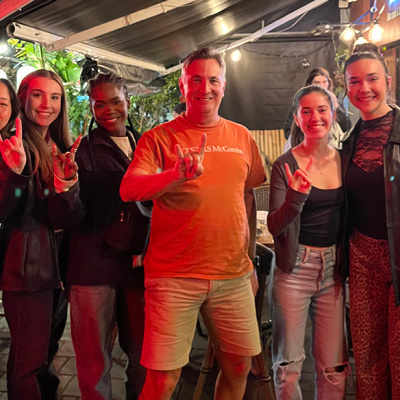Robert Devens on Taking the Helm at UT Press

Robert Devens has an important first hire to make—and he’ll likely have to do it over some form of video chat. “We’re going to be doing it all remotely depending on how the summer unfolds,” he said over a call near the end of April. “We’re improvising a little bit there.” The upside is he gets to hire his replacement for the editor-in-chief position at The University of Texas Press. [Editor's note: on July 7, UT Press announced the hiring of Dawn Durante, who will start on August 10].
On April 14, UT’s Provost’s Office announced that editor-in-chief and interim director Devens would succeed retired director David Hamrick, ’91, as director. Responsible for the Press’ list of architecture, U.S. history, and American studies books, Devens is a veteran in the university publishing industry. He spent 13 years at the University of Chicago Press, joining UT Press in 2013 as assistant editor-in-chief, assuming editor-in-chief the following year, and adding assistant director to his title in 2018. The Alcalde spoke with Devens about his new role and how the global pandemic could change the publishing industry.
Congratulations on the promotion.
Thank you. It’s mighty strange getting good news during times of bad news. It’s a weird emotional balancing act. That’s not a complaint, just an observation. [Laughs.]
Are you keeping your editor-in-chief position?
No. [Laughs.] I’m relinquishing it ASAP. I’ll continue to be the editor-in-chief until we get someone in place, but both jobs have too much going on for any person to do them both well.
Will you miss any parts of that gig?
A lot of directors who come up through editorial—as opposed to sales and marketing—they keep hold of some part of their acquisitions. I’ve decided to maintain my line of books in architecture and urban studies, for two reasons: one, I’ve been working in this field a long time. I have confidence I can continue to make a meaningful contribution to the Press’ books.
Also, it is a different muscle, a part of me that I like using and I want to keep alive. That’s the plan right now, and I’m very much hoping I can pull it off because I am passionate about those books.
How did you get involved in publishing?
I was in a graduate program in the mid-’90s when the job markets were really starting to become grim. I was doing freelance editing for faculty where I was in school [at the University of Buffalo]. I felt more compelled by working on other people’s manuscripts than my own research and I took that as an important bulletin about my life. I’m a Chicagoan by birth, and the University of Chicago Press was publishing a lot in the field I was in—literary studies—and I decided that’s where I wanted to work. That was really a very formative period for me. It marked this transition out of academia but into this area that is very intimate with the academic world.
Do you have any new initiatives?
For me, it’s a continuation of work that has already started. Some of those priorities include becoming the strongest publisher possible of books on Texas—history and beyond. I’ve spent a lot of time building out our list in architecture, we have new series, external academic editors we are working with: film, Latinx studies, those are fields we’ve been active in but they represent a redoubled effort to capture the best work in the field.
There has been a big push into books on music—like the American Music Series—since you took over as editor-in-chief.
I don’t take credit for that, but I was certainly part of the team that identified this as a strength and urged that we push it forward. It has become one of our marquee lists. Everyone knows about Hanif Abdurraqib’s book [Go Ahead in the Rain] on A Tribe Called Quest, and books outside that series, the new memoir from Kathy Valentine, All I Ever Wanted. That book I love for the way it’s both a great fit for our general interest music list but also because she’s a Texan. That’s always a goal, finding books that are ringing several different bells.
How do you see this pandemic changing the publishing industry?
It is very hard to say. This is an extreme moment, but in some ways I think publishers are more accustomed to thinking of ourselves as being in a business that is constantly having to think about where we are in relation to what is happening around us. The thing that we are keeping a very close eye on is the fate of independent bookstores. Because of the fields we are publishing in—the Texas books, music, food—we see substantial sales through bookstores. It’s also important to the people who work at UT Press that bookstores stay open because we believe they are one of the most important parts of a culture, whether or not our books are there. We want them there as citizens and as readers.
What does it mean to you to take over as director of UT Press?
A director is many things, but you are the chief spokesperson for what the Press is to the world. As director you have to be able to talk about the value of a university press in general and of UT Press in particular and how we are a great university press but also so much more than that. Getting out physically—if we are allowed, or however we are allowed—is to get the message out about what the press is and what we’re doing and why what we’re doing matters.
This interview has been edited and condensed.
Illustration by Roberto Scafidi






